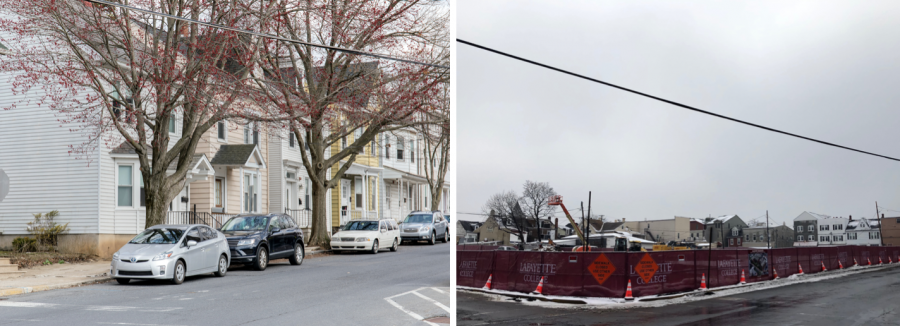After two years of tension and compromise, including an eventual lawsuit settlement, some lifelong College Hill residents say they still long for the way McCartney Street used to be. With the conclusion of the demolition of the homes along McCartney Street between High Street and March Street, residents are saddened to see the homes go.
The college and four Easton residents reached an agreement in November 2018 to end a lawsuit the residents brought against the city. They alleged that the city illegally changed zoning laws to allow Lafayette to build a four-story dorm on McCartney Street. The agreement to end the suit included terms like the moving of the Michler House at 517 Clinton Ter. and the Lafayette-Easton scholarship, which will provide full tuition to an Easton High School graduating senior.
Some residents are still upset about the events leading up to the eventual agreement.
“Lafayette from the outset presented this as a done deal and requests for citizen input were minimal,” said College Hill resident Josh Gaffney.
College officials have previously said that they sought input from residents, and compromises to meet some concerns of the residents were made. There was originally a dormitory planned for Cattell Street across from Wawa to house 50 students, but the plans for that building were scrapped.
Dennis Lieb, an Easton resident who was involved in writing the city’s zoning ordinance, echoed these sentiments. According to Lieb, he spent 19 years as a citizen activist in Easton, which included traveling around the country to attend planning conventions.
“The problem with it was that it wasn’t done in an open manner, and planning decisions in this day and age have to be done with the public invested. That wasn’t done,” Lieb said.
“Easton has a neighborhood with a college campus in it. Lafayette seems to think that they’re a college campus with a neighborhood in it. It’s the exact opposite,” Lieb added.
Residents also noted their frustrations with the role of the city’s administration and the changing of the zoning rules.
“That is a really unheard of and unusual step that I don’t think any other private developer has ever been able to get the city of Easton to do… that to me speaks of a level of collusion and disrespect to the community that is really just unacceptable,” Gaffney said.
Some believe that certain spaces on or adjacent to campus could have been utilized for new student housing in a less destructive manner.
“They could have put the dorms down the hill where they put the parking. They could have created everything in one place and created a system to get people back and forth to the main campus,” Lieb said.
For many residents, College Hill has been home for decades and the demolition on McCartney Street is “heartbreaking.”
“It’s difficult when you look at the properties that were torn down…those were part of a neighborhood. By tearing them down, you forever change the character of [the neighborhood] in a way that it will never be a neighborhood again. It can’t be,” Gaffney said.
One lifelong College Hill resident and the former superintendent of Easton schools, Tom Evans, said he has yet to pass by the construction site because he’s “not ready.”
“It’s sad for me to see it because that whole area was a neighborhood of families living there when I was growing up,” Evans said. “I just can’t quite bear to look at it yet.”
“I think the most jarring thing for me…is that when you walk out onto Cattell Street, you are now seeing this empty lot and what’s going to be a large, institutional building, and that is visually very different than what it was previously. There’s no neighborhood scale anymore. That creates a feeling of encroachment,” said Gaffney.
According to Evans, as a former superintendent, the changes in the neighborhood take on a different meaning for him.
“There were people living [in the neighborhood] with kids who went to March School… March [School] was truly a neighborhood school and it no longer is, so that whole change is just tough to take,” Evans said.
According to city planner and Lafayette professor Paul Felder, the traffic lights along Cattell Street were originally installed to serve schoolchildren crossing the street.
Lifelong College Hill resident Peggy Palmer said she’s seen the number of children living on the west side of College Hill decrease drastically.
Children have been “denied the privilege of growing up here,” Palmer said. “It’s a joy to grow up here. The west side of Cattell Street is a ghost town now when [the students] all leave [for the summer].”
Looking forward, residents are hoping for “more transparency” from the college.
“Until there’s transparency, I think there’s going to be continued tension between the community and Lafayette. I fully recognize that Lafayette does a lot of good, it’s just this is an area that really affects us,” Gaffney said.
According to Felder, a main concern of the community in regards to the future is that the college has not released plans about the other properties it owns on College Hill.
“Our concern going forward… is that the college owns more than 150 properties on College Hill,” Felder said. “The residents of the community are in a situation where the biggest property owner has a track record of not maintaining its properties and tearing them down whenever it wants to.”
“The college thinks that it has unlimited access to property up there. It owns a couple hundred buildings that aren’t even on the campus, and we have no idea what their plans are for anything,” Lieb said.
“More people want to leave because you can’t trust Lafayette,” said Palmer. “When people in the neighborhood get together, what Lafayette has done, is doing and will do is probably 65 percent of all conversations in the neighborhood. It’s a big topic and it’s a big fear,” she added.

























































































































